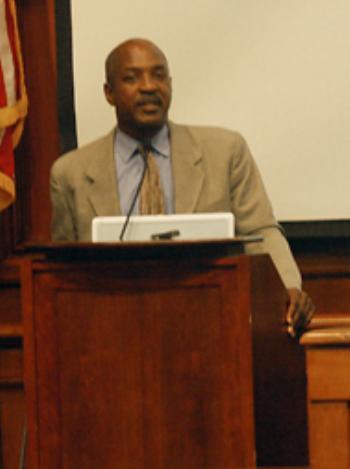
News
Summers Will Not Finish Semester of Teaching as Harvard Investigates Epstein Ties

News
Harvard College Students Report Favoring Divestment from Israel in HUA Survey

News
‘He Should Resign’: Harvard Undergrads Take Hard Line Against Summers Over Epstein Scandal

News
Harvard To Launch New Investigation Into Epstein’s Ties to Summers, Other University Affiliates

News
Harvard Students To Vote on Divestment From Israel in Inaugural HUA Election Survey
New Institute Aims To Continue Houston’s Work

They call him the man who killed Jim Crow, the beacon of the NAACP’s revolutionary crusade against segregation, and the architect of the historic Brown v. Board of Education ruling. And now, 55 years after his death, Harvard Law School (HLS) leaders hope they can finish what Charles Hamilton Houston set out to complete.
In a HLS courtroom packed with a veritable who’s who of the legal and academic communities, hundreds united in a day-long celebration of the opening of the Charles Hamilton Houston Institute for Race and Justice, a new center dedicated to carrying forth the legacy of Houston by “identifying and defining the civil rights agenda for the coming generation.”
Spearheaded by Founding and Executive Director Charles J. Ogletree, Jr., the institute will primarily focus on voting-rights issues, affirmative action, and the criminal justice system.
“I think that it is so significant that we can resurrect this legal giant in a way that makes sense,” said Ogletree, who is Climenko professor of law. “We are bringing Houston to life in the twenty-first century. That’s what this institute endeavors to do.”
Houston, a 1922 graduate of HLS, is known as a brilliant Supreme Court litigator who laid the groundwork necessary for the NAACP’s victory in the Brown v. Board of Education Supreme Court case. At HLS, he was the first black editor of the Harvard Law Review. He went on to become dean of Howard Law School, where he oversaw the education of nearly a quarter of the nation’s African-American law students.
“It would be difficult for me to think of another Law School graduate—living or deceased—that has had such an impact on equality or justice in this country,” said HLS Dean Elena Kagan, who is also the Houston professor of law.
Among the institute’s first projects will be “The O’Connor Project,” named in recognition of U.S. Supreme Court Justice Sandra Day O’Connor’s conjecture that affirmative action will no longer be necessary after 25 years. Ogletree said he plans to conduct a series of summits in hopes of devising a strategy to close the achievement gap that exists between minority and non-minority students.
The institute will also begin intensive local research on the “school to prison pipeline,” which describes the trend of minority students being placed in juvenile halls, rather than schools.
In a speech to the crowd gathered at Ames Courtroom, U.S. Supreme Court Justice Stephen G. Breyer postulated that the institute could serve as a “catalyst” between politicians and school administrators to combat inequalities that still exist in U.S. school districts.
“In many respects, you can find that segregation by race in practice between 1980 and the year 2000 has actually increased,” Breyer said. “But I see some cause for hope.”
Other planned initiatives include a program to train civil-rights lawyers to be expert witnesses; support of the reauthorization of the Voting Rights Act of 1965; a joint program with the Kennedy School of Government in criminal justice policy; and a pro-bono project to overturn wrongful convictions.
As thunderstorms shook the walls of the courtroom, many made reference to what they call the newest example of racism: Hurricane Katrina. In his speech, Ogletree showed two recent photographs and captions: one which showed a white male in water “finding bread and soda” from a grocery store, another depicting a black male in water “looting a grocery store.”
“It tells us a major story about what we need to do going forward,” Ogletree said.
For a campus that has struggled with race in the past, yesterday’s celebration also brought to light issues of prejudice within Harvard’s gates.
In remarks to the audience, University President Lawrence H. Summers acknowledged discrimination at the University and said that if Houston were still living, he would call the struggle for equality “far from finished.”
Houston “would remind us of what every African-American member of this community knows all too well: that prejudice remains in who is asked for their I.D. and who is not asked for their I.D. when they enter buildings on this campus,” he said.
Sitting just six seats to the left of Summers was Cornel R. West ’74, the former African-American studies professor who departed for Princeton University after a now-famous dispute with Summers.
Earlier in the program, Ogletree elicited smirks in the audience after he said Summers “had a significant impact on the African studies program.” And, later in the program, West began his speech by citing the “problematic president,” noting that he had even smiled and shook hands with his former foe.
“That’s the kind of Negro I am,” West said.
—Staff writer Javier C. Hernandez can be reached at jhernand@fas.harvard.edu.
Want to keep up with breaking news? Subscribe to our email newsletter.
